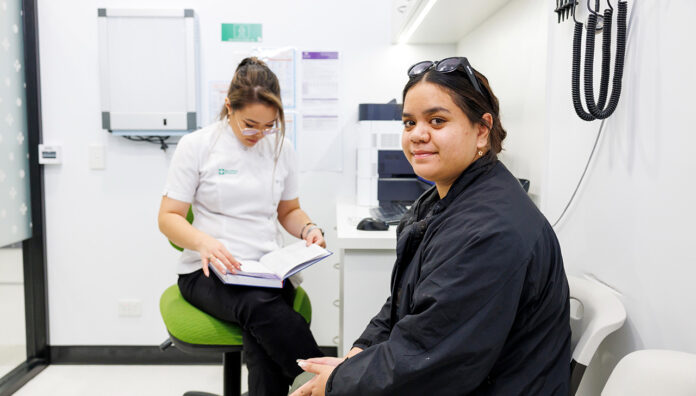Expansive changes have been made to the Therapeutic Guidelines on antibiotics, encompassing over 1,400 drug recommendations.
The first stage targets infections managed in primary care, including patient information and a dosage calculator for aminoglycosides.
A key change impacting pharmacists, GPs and patients is that trimethoprim is no longer the first-line treatment of acute cystitis in non-pregnant adults due to resistance in Escherichia coli (E. coli).
The new treatment guidance for UTI in adults includes:
- First line: nitrofurantoin 100 mg orally, 6-hourly for 5 days
- Second line: fosfomycin 3 g orally, as a single dose
- Third line: trimethoprim 300 mg orally, daily for 3 days.
Nitrofurantoin is also first line among children who are able to swallow tablets or capsules and weigh at least 29 kg.
So what does this mean for pharmacists who prescribe antibiotics for uncomplicated urinary tract infections (UTIs) under various pilots and programs, and those dispensing scripts from GPs?
Keep following protocols until further notice
Pharmacists who are authorised to prescribe antibiotics for uncomplicated UTIs must follow their jurisdiction’s pilot or program protocol, which remains in effect until further notice.
For example, this means that pharmacists in New South Wales, where trimethoprim is designated as the first-line treatment for UTI services, are required to prescribe this medicine in accordance with current protocols – unless and until the protocol is revised.
At this stage, no jurisdiction has updated its protocol. PSA and other peak bodies are currently engaging with state and territory health departments to understand how pharmacist prescribing protocols may change in response to the TG update.
National harmonisation would make clinical updates much easier
Updating protocols for UTI services across eight states and territories is not only a laborious process – it can cause confusion among pharmacists and patients alike on the best treatment course to manage their symptoms.
To remedy this, PSA and other peak pharmacy bodies are engaging with state and territory health departments to recommend uniformity across the nation, said Peter Guthrey MPS, PSA Senior Pharmacist – strategic policy.
‘At the moment, we have a TG that’s out of kilter with the requirement to follow the law,’ he said. ‘If there weren’t eight different protocols across the country, clinical recommendations could be updated much more quickly.’
However, in some instances, differences in protocols are due to various patterns of antibiotic resistance, for example:
- In Western Australia, trimethoprim is not the first-line treatment for uncomplicated UTI due to high levels of resistance
- In Tasmania, there are indications that trimethoprim will remain the first-line treatment for uncomplicated UTI due to low levels of resistance.
PSA’s guidance will change
PSA’s Treatment guideline for pharmacists – Cystitis outlines the professional obligations for pharmacists who prescribe antibiotics for uncomplicated UTI. Currently, the guideline recommends trimethoprim as the first-line treatment option, unless the patient has been treated with this medicine in the previous 3 months, or has a condition that contraindicates its use.
According to Claire Antrobus MPS, PSA Manager – Practice Support, PSA will be reviewing the Treatment guideline for pharmacists: cystitis.
Pharmacists dispensing antibiotics must use their professional clinical judgement
When a pharmacist receives a prescription for trimethoprim for an uncomplicated UTI, they should use their clinical judgment when dispensing medication, provided there are no red flags or concerns to raise with the prescriber, said Bill Wallace MPS, PSA Pharmacist – Professional Support Adviser.
‘There can be many clinical reasons, for example, a pathology result, for why the prescriber has chosen a different antibiotic,’ he said.
When dispensing a medicine, pharmacists must be satisfied that the dispensed medicine is safe and therapeutically appropriate. That doesn’t mean the treatment always needs to be optimal – but it does need to be appropriate.
There could be a reason why the doctor has not chosen first-line therapy and a proper consult would usually explain this, agreed Pooja Jedeja MPS from PSA’s Pharmacist to Pharmacist Advice Line.
‘The most important thing for the pharmacist is to ensure that the treatment is within the guidelines for a UTI and this includes checking the dosage and duration,’ she said. ‘If the pharmacist still suspects inappropriate prescribing, they should contact the doctor [to discuss].’
There are other key changes pharmacists need to know
Along with trimethoprim no longer being the first-line therapy for UTIs, further changes to antibiotic prescribing in primary care include:
- higher doses of beta-lactams are recommended for pyelonephritis to ensure sufficient antimicrobial exposure and effectiveness against Enterobacterales, including E. coli
- increased amoxicillin-clavulanate dosage for pyelonephritis and diabetic foot infections, with a suggested regimen of 875+125 mg orally every 8 hours to maintain adequate drug levels
- option to administer cefalexin every 8 hours at a higher dose for conditions such as cellulitis and pyelonephritis, addressing the difficulty of 6-hourly dosing in children.
For any queries related to changes to antibiotics prescribing and dispensing, contact PSA’s Pharmacist to Pharmacist Advice Line between 8.30am to 5.00pm AEST on 1300 369 772.




 Professor Margie Danchin[/caption]
Professor Margie Danchin[/caption]

 Dr Peter Tenni[/caption]
Dr Peter Tenni[/caption]
 How should we deprescribe gabapentinoids, according to the Maudsley Deprescribing Guidelines[/caption]
How should we deprescribe gabapentinoids, according to the Maudsley Deprescribing Guidelines[/caption]









